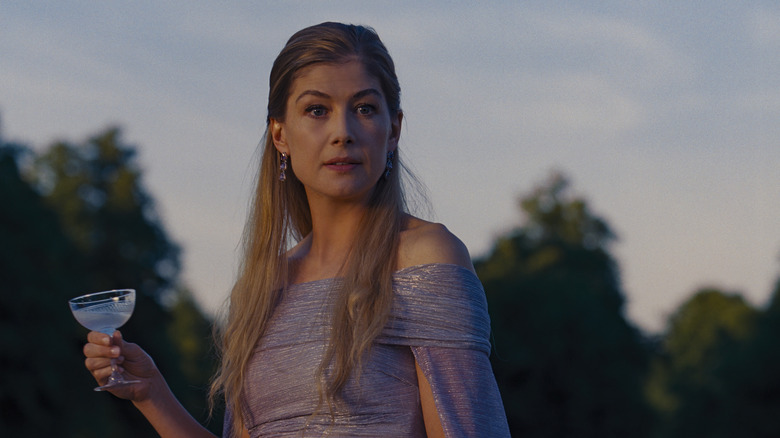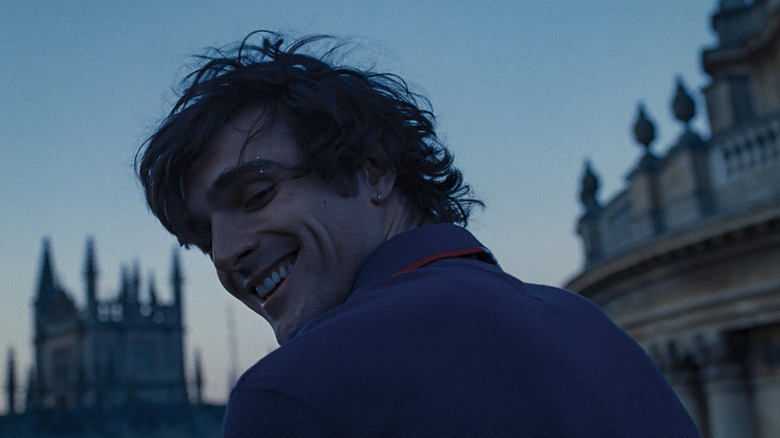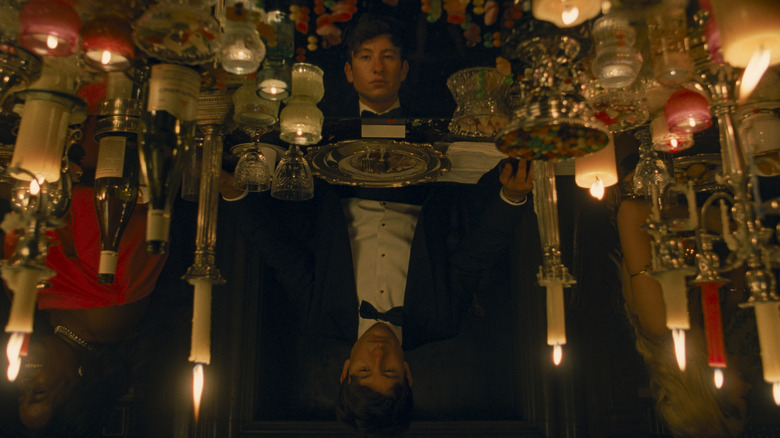Saltburn Review: Barry Keoghan Is Outstanding In 2023's Bleakest Comedy [Fantastic Fest]
"Saltburn" is a different kind of monster movie.
Playing like a gothic romance (in the traditional sense of the word) retold through the lens of Patricia Highsmith's Ripley stories, it's one of the bleakest films of 2023, and a real bad time at the movies. In a good way — this is a film that revels proudly in its darkness. Because writer/director Emerald Fennell, who proved adept at pushing the right buttons with the similarly cruel "Promising Young Woman," knows that monsters can be seductive, that we can and will have sympathy for the devil, and that we'll follow an especially clever creature to the ends of the earth if they prove interesting enough.
And Oliver Quick, played by Barry Keoghan with the kind of shocking bravery that has catapulted him to the top of the "most interesting actors in the world" list over the past few years, is a special kind of monster. He's too devious, too smart, to hate. He's the infestation in the attic that you can't remove. You admire its persistence. If you can't destroy it, you begrudgingly respect it. Fennell knows the appeal of a carefully orchestrated, slow-motion car crash. Even when you can see "Saltburn" taking the curve too fast, its passengers doomed, you lean in closer. The only thing more exciting than a hero to root for is the villain who finds his way out of every predicament.
Fast train to hell
You'll be forgiven for feeling that Oliver Quick is a pathetic boy, worthy of your sympathy. He's at Oxford on a scholarship, surrounded by rich kids who won't give him the time of day. But a series of events puts him in the close social orbit of Felix Catton (Jacob Elordi), a beautiful, loaded kid whose family lives in the literal castle that gives the film its name. One thing leads to another. Oliver is invited to spend the summer with Felix and his family. And then he doesn't leave. And then things start to get bleak.
Much of the appeal of "Saltburn" comes from the slow unraveling of Oliver's true character. What does this guy want out of this summer vacation? What does he want out of his relationship with Felix? We watch him watch: he observes Felix's parents, the dim-witted Sir James (Richard E. Grant, hilarious) and the vacuous Elspeth (Rosamund Pike, the supporting cast's MVP). He co-exists with Farleigh (Archie Madekwe), Felix's American bud who's instantly suspicious of this addition to the social circle. He pokes and prods Venetia (Alison Oliver), Felix's troubled sister.
But what does Oliver want with these people? By the time we find out, we are, like everyone unfortunate enough to be in his orbit, in too deep. We've shared too much time with this guy, seen too many of his darkest moments, to completely abandon our support. "Saltburn" demands we stay on the train to a special kind of hell even if the conductor may not be trustworthy, because he's certainly not boring.
Highsmith, Hitchcock, and hijinks
While "Saltburn" is a tonal cousin to "Promising Young Woman," with its blend of pitch-black comedy, aggressive social commentary, and gnarly thriller theatrics, Fennell's direction adapts to the change in surroundings. The slightly gritty, grounded look of her previous work gives way to something more gothic and lavish, a camera whose framing suggests a grand regency romance or a Jane Austen adaptation, but whose contents would make Alfred Hitchcock smirk. "Saltburn" never takes the plunge into full-blown thriller territory, but it does flirt with Hitchcock's wryest thrillers. "Strangers on a Train" and "Rope," his films about brilliant psychopaths, come to mind. The former was an adaptation of Patricia Highsmith, to whom Fennell's script owes a massive debt. If you're looking for this generation's riff on "The Talented Mr. Ripley," one that captures the seductive power of spending time with a very, very, very bad fellow, you've come to the right place.
But what of that very bad fellow? What of Oliver? And what of Barry Keoghan, coming off a career-best performance in "The Banshees of Inisherin," a performance that exposed a broken, lovable soul buried under brilliant, dimwit comedy? Keoghan's work here couldn't be more different, but the film leans on what we expect from actors who look like him. Keoghan's small frame and soft face suggest an inherent intelligence and innocence, which makes the sharp edges that emerge, the profound cruelty, all the more startling. There are actors we want to see read the phone book out loud, but Keoghan belongs to a different category: actors we want to watch lost in thought. The gears are always turning behind Oliver's gaze, and Keoghan ensures we want him to keep getting what he wants, because we want to see those gears turn again and again.
Keoghan and Fennell are a perfect match
Like "Promising Young Woman" before it, "Saltburn" is designed to rub you the wrong way, to get under your skin and make your morals itch for two hours. You will feel bad watching it, and you will feel bad laughing as often as you do once you realize the more genial comedy of manners in the first half has evolved into something far more upsetting in the back half. Emerald Fennell remains a filmmaker to watch, a provocateur who's downright giddy to sit in the muck with you, teeth flashing in a deadly grin. And in Barry Keoghan, she's found a collaborator who understands her nasty sensibilities and digs in up to the hilt.
/Film Rating: 8.5 out of 10



